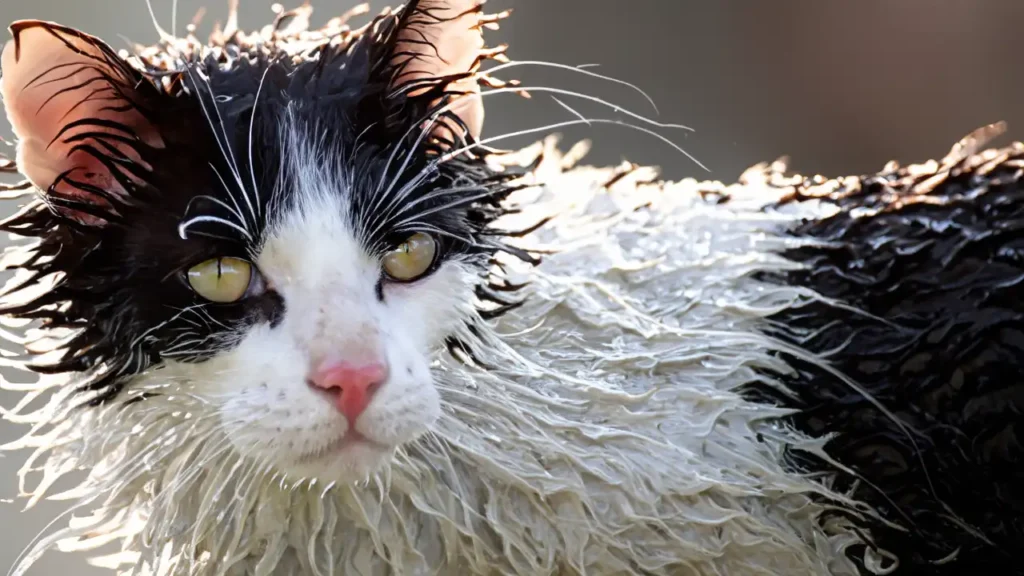Cats have a notorious reputation for hating water. As soon as a feline senses the slightest drop of water, you can expect dramatics – flattened ears, arched backs, fluffed fur, and frantic scrambles to get away. This extreme aversion to getting wet perplexes cat owners worldwide. Why do our furry companions despise water so much? As it turns out, there are several evolutionary and behavioral explanations behind cats’ aquatic adversity.
Table of Contents
Evolutionary Origins
Cats did not always detest water. Their wild ancestors, such as lions, tigers, and leopards, were adept swimmers when necessary. But the origins of today’s domestic cat are traced back to the Arabian and Sahara wildcats of Africa and the European wildcat. These feline species thrived in dry, desert regions, so swimming was not necessary for their survival. As cats became domesticated, the strong swimming instincts faded away.
The earliest domesticated cats first emerged in the Fertile Crescent region over 10,000 years ago. These agricultural settlements provided a proliferation of rodents, attracting wild cats to hunt them. As humans realized having feline pest control was beneficial, the symbiotic relationship between people and cats developed. Since these early cats were not descended from jungle cats that relied on swimming to survive, they did not retain that ability. Consequently, most domestic cats inherited an innate dislike of water.
Fur and Water Repellency

A cat’s fur coat is designed to repel water. Their fur has unique properties that prevent it from getting soaked all the way to the skin when coming into contact with moisture. The outer layer of fur is coated with natural oils that cause water to bead up and roll right off it. This water-resistant adaptation helps cats stay warm and dry. When submerged in water, this protective barrier gets completely saturated, causing great distress.
A cat’s fur is made up of two layers – the undercoat and the overcoat. The undercoat is a layer of fine, dense fur that insulates their skin. The overcoat is comprised of longer, coarser guard hairs that we see. These guard hairs are excellent at repelling water due to their unique structure. The cuticles on the hairs form a protective, water-repellent barrier.
Additionally, cats have sebaceous glands underneath their skin that secrete oils. These oils get distributed along the hair shafts to provide a waterproof coating. When cats meticulously groom themselves, they spread these oils evenly over their coats. All these specialized adaptations make the fur incredibly effective at shielding cats from getting drenched.
Sensitivity to Cold and Temperature Regulation
Since cats are susceptible to hypothermia, their bodies are designed to conserve heat at all costs. Their fur coat provides insulation to maintain a consistent body temperature of around 101-102°F. When cats get wet to the skin, it compromises this insulation and causes them to lose body heat rapidly. This makes cats feel instantly chilled when making contact with water. The cold sensations they experience when wet likely create negative associations.
Cats have a lower body temperature and higher metabolic rate compared to humans. This means they lose internal heat more quickly. When a cat’s fur gets doused with water, it disrupts the insulation and allows cold air to reach the skin. The resultant heat loss can cause a cat’s temperature to plummet dangerously fast. These extremely sensitive temperature regulation systems make getting wet very unpleasant for felines.
Instinctual Behavior and Self-Grooming
Grooming is an instinctual feline behavior, which serves the purpose of removing dirt, odors, and pests from their coats. Their saliva contains cleansing enzymes, and their barbed tongues can extract foreign debris and loose hair. When cats’ fur gets doused with water, it interferes with their natural cleaning routines, making grooming more difficult until their coats are completely dried out. This can be frustrating and uncomfortable.
Negative Experiences and Lack of Exposure
For kittens and cats who lack early positive exposure to water, it can be an unfamiliar and frightening experience later in life. If their first encounters with water involve negative events like falling into a pool or getting sprayed with a hose, it can cement their aversions. Without gradually acclimating cats to water when they are young, it becomes challenging to reverse these deep-rooted fears.
Individual Personality and Preference
While most cats seem to intrinsically dislike water, some breeds and individual cats are more prone to enjoying it. Breeds like Turkish Vans, Maine Coons, and Bengals have reputations for being attracted to water. But even among breeds that tend to dislike it, occasionally an individual cat defects from the norm and learns to tolerate or even enjoy splashing in their water bowl or playing with water toys.
Conclusion
The combination of evolved physical traits, ingrained behaviors, and unique life experiences shape cats’ dubious relationship with water. Their adventures will always be of the land-loving variety. While most cats will go to great lengths to avoid getting drenched, perhaps with understanding and early positive experiences, we can dampen their aquaphobia. By knowing the roots of cats’ water woes, cat owners can better understand their pet’s amusing aquatic adversities.
FAQ: Why Do cats hate water
Q: Are all cats afraid of water?
A: While a dislike of water is common in cats, some breeds like Turkish Vans and Maine Coons are known to enjoy water more than other breeds. Even in breeds that tend to dislike water, some individual cats may have a curiosity about it.
Q: Why do cats run away from water?
A: Cats have an instinctive drive to avoid getting wet because their fur loses its insulating properties when soaked. The sensitivity to temperature change and cold sensations when wet cause cats distress. Their natural water-repellent coat also makes grooming difficult when drenched.
Q: Do cats not like water because they can’t swim?
A: While domestic cats lack strong swimming instincts, the bigger issue is their aversion to getting wet in the first place. Even cats that can swim scrabble to get out of water quickly. Their body physiology and grooming behaviors make the sensation of being waterlogged uncomfortable.
Q: How can I bathe my cat if they hate water so much?
A: Start slowly with just a wet washcloth, rewarding calm behavior. Work up to allowing them in an empty tub. Gradually add a bit more water over many sessions. Always use positive reinforcement and go at their pace without forcing interactions.
Q: Why does my cat attack me when I’m in the shower?
A: The sound of running shower water may create associations with distressing water experiences. They may think you need rescuing. Using treats and play to redirect them and desensitize them to shower sounds can help curb this behavior.
Q: Are big cats like tigers and lions also afraid of water?
A: Big cats are natural swimmers and do not share the same innate dislike of water. Their wilderness origins require adaptations for entering water to hunt prey. Domestic cats lost these instincts as they lived closely with humans.


